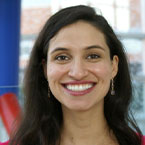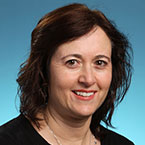By: Kimberly M. Dickinson, MD, MPH & Theresa W. Guilbert, MD, MS, FAAP
Face masks are still an important tool for many families to help prevent the spread of SARS-CoV-2, the virus that causes COVID-19. This includes new and more contagious variants.
Masks help protect unvaccinated and vaccinated people, and are important for individuals to use in areas where the
COVID-19 Community Level is high. Masks can be safely worn by all children older than 2 years. Individuals may choose to continue wearing face masks when they go out so they can protect themselves or their family members.
Some parents may have concerns about face masks, and we're here to help. Here are some common questions, along with the facts about kids and masks that will put your mind at ease:
Do masks make it harder for my child to breathe?
There have been concerns that face masks can reduce oxygen intake, and can lead to low blood oxygen levels, known as hypoxemia. However, masks are made from breathable materials that will not block the oxygen your child needs. Masks have not been shown to affect a child's ability to focus or learn in school. The vast majority of children age 2 or older can safely wear face masks for extended periods of time, such as during preschool or at child care. This includes most children with special health care needs.
Can masks interfere with a child's lung development?
No, wearing a face mask will not affect your child 's lungs from developing normally. This is because oxygen flows through and around the mask, while blocking the spray of spit and respiratory droplets that may contain the virus. Keeping your child's lungs healthy is important, which includes preventing infections like COVID-19.
Do masks trap the carbon dioxide that we normally breathe out?
No. There have been false reports that face masks can lead to carbon dioxide poisoning (known as hypercapnia) from re-breathing the air we normally breathe out. But this is not true. Carbon dioxide molecules are very tiny, even smaller than respiratory droplets. They cannot be trapped by breathable materials like disposable masks. In fact, surgeons wear tight fitting masks all day as part of their jobs, without any harm.
Children under 2 years of age should not wear masks since they may not be able to remove them without help. Children with severe breathing problems or cognitive impairments may also have a hard time tolerating a face mask and extra precautions may be needed.
Can masks lead to a weaker immune system by putting the body under stress?
No. Wearing a face mask does not weaken your immune system or increase your chances of getting sick if exposed to the COVID-19 virus. Wearing a mask, even if you do not have symptoms of COVID-19, helps prevent the virus from spreading.
How do masks prevent the spread of COVID-19?
When worn correctly, face masks create a barrier that reduces the spray of a person's spit and respiratory droplets. These droplets play a key role in the spread of COVID-19 because they can carry SARS-CoV-2, the virus that causes COVID-19. Masks also can protect you from others who may have coronavirus but are not showing symptoms and who could come within 6 feet of you, which is how far respiratory droplets can travel when people sneeze or cough or raise their voices.
Another benefit of wearing masks is that they may keep people from touching their mouths and faces, which is another way
COVID, colds, flu and RSV and other respiratory diseases are spread.
Remember
Masks are an important strategy to prevent COVID from spreading, especially as new contagious variants circulate. Masks are safe and effective for anyone age 2 years or older. Don't hesitate to talk with your child's pediatrician if you have any questions about your child wearing face masks.
More information
About Dr. Dickinson
 Kimberly M. Dickinson, MD, MPH, FAAP, a pediatric pulmonary fellow at Johns Hopkins University in Baltimore, Md., is a past member of the AAP Section on Pediatric Pulmonology and Sleep Medicine Trainee Subcommittee.
Kimberly M. Dickinson, MD, MPH, FAAP, a pediatric pulmonary fellow at Johns Hopkins University in Baltimore, Md., is a past member of the AAP Section on Pediatric Pulmonology and Sleep Medicine Trainee Subcommittee.
About Dr. Guilbert
 Theresa W. Guilbert, MD, MS, FAAP, is a professor of pediatrics at the University of Cincinnati and director of the Cincinnati Children's Hospital Medical Center Asthma Center in the Pulmonary Division. She is a member of the AAP Section on Pediatric Pulmonology and Sleep Medicine Executive Committee.
Theresa W. Guilbert, MD, MS, FAAP, is a professor of pediatrics at the University of Cincinnati and director of the Cincinnati Children's Hospital Medical Center Asthma Center in the Pulmonary Division. She is a member of the AAP Section on Pediatric Pulmonology and Sleep Medicine Executive Committee.